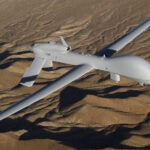By Calvin Biesecker DRS Technologies [DRS] disclosed last week that a foreign company offered it more money for a potential acquisition than the $81 per share it eventually accepted from Italy's Finmeccanica but that its board of directors decided against the higher offer, saying it carried more risk because it wasn't final and because terms and conditions hadn't been offered. However, DRS used the $85 per share offer it received from Company X, as the other foreign firm is referred…
Contract Updates
Southeastern Kentucky Rehabilitation Industries (Corbin, Kentucky) – $14,312,903
Southeastern Kentucky Rehabilitation Industries,** Corbin, Kentucky, has been awarded a maximum $14,312,903 modification (P00008) to a five-year contract (SPE1C1-24-D-N017) with no option periods adding various boonie covers via conversion. This is a firm-fixed-price, indefinite-quantity contract. The ordering period end date…
Teradyne Inc. (North Reading, Massachusetts) – $16,723,189
Teradyne Inc., North Reading, Massachusetts, has been awarded a maximum $16,723,189 firm-fixed-price contract for circuit card assemblies. This was a sole-source acquisition using justification 10 U.S. Code 3204 (a)(1), as stated in Federal Acquisition Regulation 6.302-1. This is a one-year…
Ham Produce and Seafood Inc. (Honolulu, Hawaii) – $26,250,000
Ham Produce and Seafood Inc.,* Honolulu, Hawaii, has been awarded a maximum $26,250,000 fixed-price with economic-price-adjustment, indefinite-delivery contract for fresh fruits and vegetables. This was a competitive acquisition with three responses received. This is a five-year contract with no option…
Longbow LLC (Orlando, Florida) – $11,203,243
Longbow LLC, Orlando, Florida, was awarded an $11,203,243 modification (P00017) to contract W58RGZ-22-C-0053 for sustainment of the Apache AH-64D/E Model Fire Control Radar, including depot-level and supply support elements and program management functions. The modification brings the total cumulative face…













